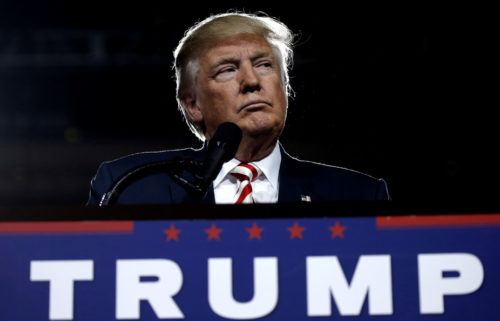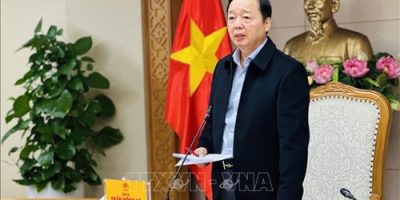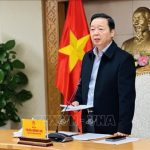
Yusuf Bangura (Switzerland): Sierra Leone Telegraph: 03 November 2025:
The article, ‘’Hypocrisy as Policy’’, by Global Geopolitics (attached) is a good reaction to Trump’s insane, but self-serving, threat to invade Nigeria under the pretext of stopping a so-called Christian genocide in that country. However, his insanity may not be without material foundations.
As the Global Geopolitics article notes, Nigeria is located within a resource-rich region that is highly important to the supply chains of US hi tech companies and defence industries. That region stretches from Nigeria through Niger and Chad to Sudan and is endowed with vast amounts of uranium, lithium, cobalt, and rare earths.
Apart from oil, Nigeria has vast reserves of lithium, cobalt, nickel and rare earth elements, which are embedded in solid rock and heavy mineral sands. It is ranked fifth globally in rare earth deposits—behind China, the U.S., Myanmar and Australia.
The US has been strategising about how to end its high level of dependence on China for rare earths, which are used in clean energy, such as electric vehicles, solar panels and wind turbines; as well as in electronic consumer products, such as LED screens, computers and smart phones.
These minerals are also required to produce jet engines, missile guidance and defence systems, satellites, and GPS equipment.
After threatening China with a 140% tariff when China imposed restrictions on the global supply of rare earths, Trump quickly made a U-turn in his recent meeting with China’s president, Xi. He realised that a trade war with China on rare earths would profoundly hurt the US economy.
Under the deal he struck with Xi, Trump agreed to end the tariff threat and lift the ban on Chinese companies’ access to US chips, while Xi agreed to restart China’s supply of rare earths and purchase U.S. soyabeans for one year. Trump praised Xi as a great leader when he returned to the US.
It is clear that the US is in panic mode in the geopolitics of rare earths trade. In his recent visit to Southeast Asia, Trump signed a raft of agreements with several countries in the region to beef up the production and processing of rare earths and exports to the U.S.
Various reports by experts in geopolitics in the US indicate that the Trump administration sees Africa as an important source of critical minerals that will help wean the U.S. from China.
The administration brokered a peace deal between the Democratic Republic of Congo (DRC) and Rwanda in June 2025, which included an investment agreement that allows the U.S. to invest in DRC’s minerals. Deals with other countries, such as Kenya, Tanzania, Angola, Malawi, and Namibia are being discussed or supported.
US interests are not driven by humanitarian concerns
The history of the US’s quest for foreign resources indicates that the US uses multiple strategies to achieve its goals: coercion, war, bribery and diplomacy. Coercion involves suspending aid or other economic opportunities (such as low tariffs) and political support to compel an adversary to bend to the will of the U.S.
When Trump suspended the US’s aid programme and declared a global trade war in April 2025, several African and other leaders rushed to make deals with him. *Global Witness* revealed in July 2025 that 17 countries (including six from Africa—viz Angola, DRC, Liberia, Mozambique, Rwanda and Somalia) have hired Trump loyalists as lobbyists, to help broker deals, ‘’with many bartering key resources including minerals in exchange for humanitarian or military support’’.
The use of war to pursue US strategic and economic interests is well documented. During the Cold War, the US and other Western countries simply intervened in countries that threatened their vital interests without bothering to disguise their actions with lofty humanitarian objectives.
One of the most famous cases was the US invasion of Guatemala in 1954 to stop the land reform programme by a leftist government that threatened the land holdings of the United Fruit Company—a US multinational with considerable power and interests in Central America.
The brazen Anglo-French invasion of Egypt in 1956 when Egypt nationalised the Suez Canal is another well known case.
Often, when US interests were threatened, rather than go to war, US leaders relied on the CIA to work with local elements in the military to engineer a change of government or kill the incumbent president.
The cases are overwhelming—such as the murder of Congo’s Patrice Lumumba in 1961, and the overthrow of Mohammed Mossadegh of Iran in 1953 and Salvador Allende of Chile in 1973. All these countries had huge mineral resources.
The rationale used by the US and its Western allies for invading countries changed when the Cold War ended in the 1990s and the US emerged as the sole superpower. The concept of humanitarian intervention gained ground within the UN system. This involved the US and other Western powers working through the UN to end wars and rebuild war-battered societies.
During that period, the US felt it didn’t face any more existential threat like communism and could act as a moral policeman of the world while hiding its real interests. That posture rhymed with the political values of the unipolar world: the spread of democracy, human rights, and markets.
The US, however, faced stiff resistance from most countries when it tried to use humanitarianism to overthrow governments that it didn’t like without evidence to support its claims.
Matters came to a head in 2003 over Iraq, which the US invaded under the humanitarian pretext of disarming it of nuclear weapons. It turned out that there were no such weapons. The US was simply after Iraq’s oil and helping to dismember a formidable foe of Israel.
As the Global Geopolitical article demonstrates, US interventions under the pretext of humanitarianism have always been catastrophic for the people of those counties. After the old regime has been dislodged, the US often leaves the countries affected to sort out the mess while it retains control of the resources that are the hidden but real reason for the interventions.
Nigeria’s violence has multiple dimensions
Numerous reports and studies have shown that Nigeria’s violence affects both Christians and Muslims. No group is insulated from it. I can think of basically six types of violence in that country.
The first three are the Boko Haram, Islamist-inspired violence in the Northeast, whose main victims are Muslims who reject their Islamist ideology; banditry in the Northwest, which affects Muslims and Christians in equal measure; and the herder-farmer conflict in the Middle Belt, which affects Christians and Muslims, although reports indicate that Christians are the main victims of that violence.
The other three types of violence are the herder-farmer violence in the Northwest in which Fulani herders are reportedly pitched against Hausa farmers (both groups are Muslim); the violence inflicted by the Indigenous People of Biafra and bandits in the East against their own people, Igbos, who are Christian; and general banditry in large parts of the country that has rendered travelling by road between cities a risky venture.
As can be seen from this review, while it can be argued that the Nigerian state’s policy of poor economic management, corruption and social exclusion have driven ordinary people to the edge, the state itself is not the key actor that is generating the violence. Non-state actors actively drive it.
I’ve tried to imagine what the US would do if it were to carry out its military threat. Would it bomb the Tinubu government out of existence, which would lead it to confront the real terror groups? Or would it ignore the Tinubu government and carry out a bombing campaign against the terrorists?
Either way, the US will be involved in a messy and costly guerrilla war that it will have no stomach to fight.
It is important to note that the US has never been successful in defeating terror groups in their own countries. It lacks the energy, zeal, and commitment to sustain a long drawn out war. US history of intervention to save humanity is littered with abject failure: Iraq, Libya, Syria, Afghanistan, and Somalia hold sobering lessons.
However, the chaos of intervention may not prevent the US from trying to control Nigeria’s rich resources. Mining companies have a reputation of thriving in conflict zones by striking deals with local militias.
Tinubu has released a press statement in which he highlighted his government’s policy of engagement, since 2023, with Christian and Muslim leaders to address security challenges that affect ‘’citizens across faiths and regions’’. He affirmed that Nigeria is not a religiously intolerant country and opposes ‘’religious persecution’’.
However, his conclusion in the press release that his ‘’administration is committed to working with the United States government and the international community to deepen understanding and cooperation on protection of communities of all faiths’’ has raised eyebrows.
Could this be what Trump really wants to achieve with his military threat?: Get the Tinubu administration to open talks with the U.S., which will then try to introduce the issue of rare earths and other minerals in the negotiations.



















